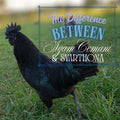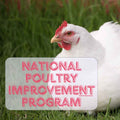
Importance of B Vitamins to Poultry Health and Development
In this poultry care article, we will explore the importance of each B vitamin, the consequences of deficiencies, and how to recognize and address these deficiencies to ensure your poultry remain healthy and productive.
Supplements may be necessary to provide the required B vitamins that your poultry's biology needs to function at optimum health.
Subscribe
To join our mailing list and never miss an update!
Maintaining the health and development of your poultry hinges on the availability of essential nutrients, particularly the nine B vitamins. Each of these vitamins plays a crucial role in the physiological functions and overall wellbeing of chickens, ensuring they grow, thrive, and reproduce effectively. The B vitamins essential for poultry health include:
• B1 (Thiamine)
• B2 (Riboflavin)
• B3 (Niacin)
• B4 (Choline)
• B5 (Pantothenic Acid)
• B6 (Pyridoxine)
• B7 (Biotin)
• B9 (Folic Acid)
• B12 (Cyanocobalamin)
It's important to note that vitamin deficiency symptoms that appear in baby chicks are most likely the result of a vitamin deficiency in the breeding hen that developed the egg. Low development and hatch rates are also a sign that the breeding hen is suffering from a nutritional imbalance.
Vitamin B1 Thiamine Deficiency
Thiamine, or Vitamin B1, is essential in the healthy development of the neurological system that controls muscle movement. Glucose is the main source of energy for all brain and neurological functions. The metabolic process of breaking down the glucose for use by the body requires thiamine. A vitamin B1 supplement may be necessary in senior chickens as their body’s utilization of vitamins decreases with age.

Signs of a thiamine deficiency include the following:
• Muscle paralysis that starts in the toes and progresses up to the neck.
• Lethargy and the inability, or lack of wanting, to stand. The bird will prefer sitting on his haunches and any mobility will be in this lowered position.
• Ataxia (lack of muscle control) and tremors
• Stargazing is the telltale sign of a B1 deficiency. The bird loses control of its’ neck and appears to be looking at the stars. This is caused by paralysis of the anterior neck muscles. Another name for this condition is wry neck.
Vitamin B2 Riboflavin Deficiency
Riboflavin is crucial to the barrier tissue that lines the body and the protective covering surrounding the major nerves. Riboflavin degrades and becomes ineffective when exposed to UV rays or sunlight. Any feed exposed to sunlight will contain little, if any, riboflavin for use by the chicken’s bodily functions.
This is also the reason that most commercially available chick feeds are insufficient at meeting the minimal nutritional requirements for riboflavin that your poultry need. Fermented feed contains greater levels of riboflavin than bag feed.

In chickens, a deficiency in riboflavin (vitamin B2) often results in curled toes, impeding their ability to walk. Riboflavin deficiency also results in decreased egg production and can even prevent fertilized eggs from developing.
When a poultry feed lacks essential vitamins, signs of riboflavin deficiency typically manifest first. Chicks that are fed a diet lacking sufficient riboflavin may still consume food, but they will experience slow growth, weakness, and diarrhea approximately 12 weeks after hatch. Abnormal walking patterns are not uncommon when poultry suffer from a diet low in riboflavin requirements. In severe cases, they may even lie down with their legs extended in different directions.
Vitamin B3 Niacin Deficiency
Niacin deficiency presents significant challenges for both the skin and digestive system. Initially, individuals may experience decreased appetite, slowed growth, weakness, and diarrhea. This insufficiency can result in swelling in the joint of the lower leg, abnormal curvature of the legs, poor feather development, and dermatological issues, particularly around the head and feet.
In young chickens, niacin deficiency may manifest as "black tongue," characterized by inflammation in the tongue, mouth, and throat around the age of two weeks. Hens may experience weight loss, decreased egg production, and reduced hatchability rates.
Turkeys, ducks, pheasants, and goslings tend to be more severely impacted by niacin deficiency than chickens, possibly due to their less efficient conversion of tryptophan into niacin. Ducks and turkeys suffering from niacin deficiency often exhibit pronounced leg deformities and joint swelling.
A notable distinction between leg abnormalities resulting from niacin deficiency and perosis, associated with manganese or choline deficiency, is the infrequency of the Achilles tendon slipping from its designated position in cases of niacin deficiency.
Vitamin B4 Choline Deficiency

Trending Articles
Vitamin B5 Pantothenic Acid Deficiency

Vitamin B6 Pyridoxine Deficiency

Vitamin B7 Biotin Deficiency
Biotin plays a vital role in chick development by supporting the activity of enzymes involved in carbohydrate metabolism, fatty acid synthesis, and energy production. Its presence is necessary for proper growth, development, and overall metabolic function in chicks.
Insufficient levels of biotin, aka vitamin B7, can lead to dermatitis in the feet and the skin surrounding the beak and eyes, similar to the effects of pantothenic acid deficiency. Perosis, a condition characterized by skeletal deformities, and footpad dermatitis are also common signs of biotin deficiency. When hens are fed a diet lacking in biotin, embryos and newly hatched chicks may exhibit congenital perosis, ataxia, and skeletal deformities.
There are several factors that can increase the need for biotin in chicks. These factors include the oxidation of fat in rancid feed, competition from intestinal microorganisms, and the lack of biotin transfer to newly hatched chicks.

Vitamin B9 Folic Acid Deficiency
Folic acid is crucial for proper brain function and assists in the production of DNA and RNA. It is especially important when cells and tissues are growing rapidly. Folic Acid is simply the synthetic version of Vitamin B9. Naturally produced vitamin B9 is called folate.
In adult chickens, vitamin B9 deficiency is marked physically by pale combs and wattles, decreased egg production, poor feathering, and lower hatch rates in offspring. Hens deficient in folic acid tend to produce embryos that die immediately after pipping the air cell during the later stages of incubation. Chicks that require assistance to hatch often suffer from leg deformities.
In chicks, folic acid deficiency manifests in a variety of symptoms, including poor feathering, an anemic appearance marked by a waxy white comb and pale mucous membranes in the mouth, lethargy, reduced feed intake, and slow growth. Without supplemental correction, vitamin B9 deficiency also leads to abnormal skeletal development, such as perosis.

Vitamin B12 Cobalamin Deficiency
Vitamin B12, also known as cobalamin, plays several critical roles in the wellbeing of poultry. It is indispensable for the synthesis of DNA, which is essential for the growth and development of cells. Additionally, vitamin B12 is crucial for the production of red blood cells, ensuring proper oxygen transport throughout the body. Vitamin B12 also aids in maintaining a healthy nervous system in poultry, supporting optimal nerve function and mental wellbeing.
Chickens lacking sufficient vitamin B12 often exhibit symptoms related to nervous system dysfunction, including leg weakness and perosis. Additionally, these chickens may show signs of poor feather development and lower hatchability rates when they are bred. Embryos deficient in vitamin B12 typically do not survive past approximately day 17 of development.

Ensuring that your poultry receives an adequate supply of essential B vitamins is crucial for their health and productivity. Each B vitamin plays a unique role in various physiological processes, including growth, neurological function, energy metabolism, and reproductive health. Deficiencies in these vitamins can lead to a range of health issues, from poor feathering and growth retardation to severe neurological and skeletal deformities.
By providing a well-balanced diet that meets the nutritional needs of your chickens, you can prevent these deficiencies and promote robust development and optimal egg production. Understanding the signs of B vitamin deficiencies and addressing them promptly will help maintain the well-being and efficiency of your poultry flock.
Trending Products
Copyright©2024 All rights reserved. We love to have you share our article as long as you include a direct link to this page. This article or any portion thereof , including all images, may not be reproduced or used in any manner whatsoever without the express written permission of Gypsy Shoals Farm.



